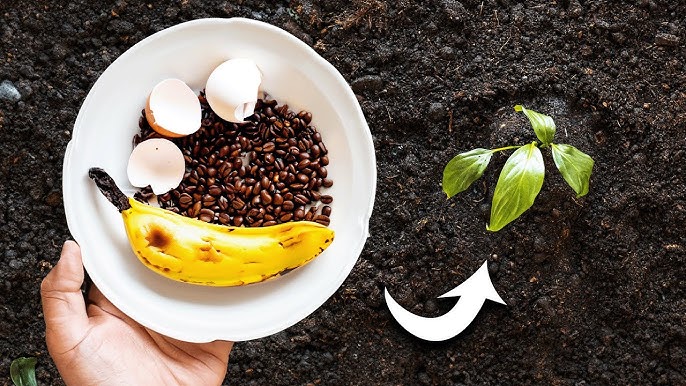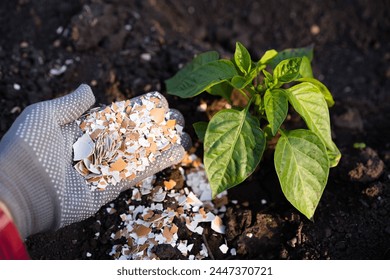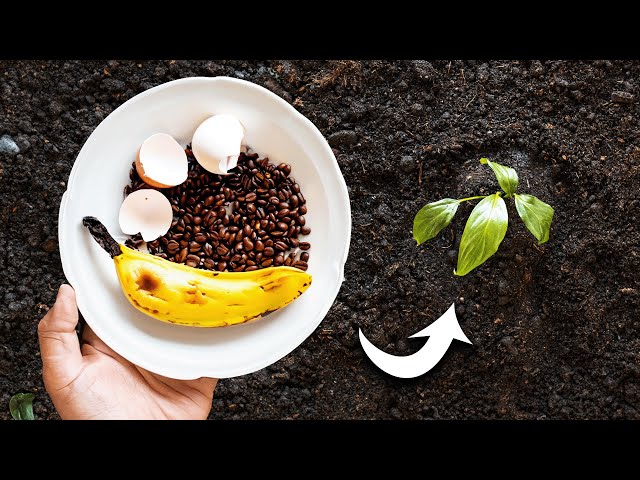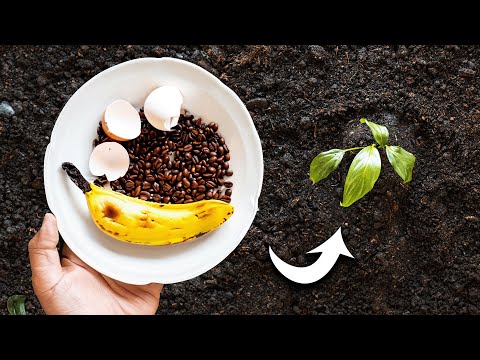
7 Genius Kitchen Scrap Hacks for a Thriving Garden
[VISUAL: Woman sprinkling coffee grounds around tomato plants]
Do you ever feel a twinge of guilt as you toss vegetable peels, coffee grounds, or eggshells into the trash? We've all been there. But what if I told you that those seemingly useless kitchen scraps could be the secret to a flourishing garden? Not only can repurposing kitchen waste reduce your environmental impact and save you money on fertilizers, but it can also significantly boost your plants' health and vitality. It's a cornerstone of sustainable home living, adding a touch of farmhouse life to your everyday routine.
In this post, we’ll reveal 7 practical and often surprising ways to transform your kitchen scraps into valuable resources for your garden. Get ready to unlock the hidden potential in your food waste and watch your garden thrive!
Coffee Grounds: The Nitrogen Boost Your Garden Craves
Coffee lovers, rejoice! Your daily habit can directly benefit your garden. Coffee grounds are a fantastic source of nitrogen, an essential nutrient for plant growth. They also help improve soil structure, particularly in clay soils, by increasing aeration and drainage.
While coffee grounds are slightly acidic, this is generally only a concern for plants that prefer alkaline soil. Composting the grounds first helps to neutralize the acidity. Acid-loving plants like blueberries, roses, and tomatoes absolutely thrive with a little coffee boost.
- Actionable Tip: Apply coffee grounds directly to your garden soil in a thin layer, avoiding piling them up around the base of plants, which can create a barrier.
- Actionable Tip: Compost coffee grounds with other organic materials like leaves and grass clippings for a well-balanced compost.
My grandmother swore by coffee grounds for her prize-winning roses. She’d spread them around the base of each bush every few weeks, and the blooms were always spectacular. The secret to her organic gardening was that she used the free ingredients that she had on hand.
Key Takeaway: Coffee grounds are a simple and readily available source of nitrogen to boost plant growth and provide a dose of cozyliving to your garden.
Eggshells: Calcium Power for Stronger Plants
[VISUAL: Crushed eggshells scattered around pepper plants]
Calcium is crucial for plant cell wall development, making plants stronger and more resistant to diseases. Eggshells are a readily available source of this vital nutrient. One of the most well-known benefits of eggshells is their ability to prevent blossom-end rot in tomatoes and peppers, a common problem caused by calcium deficiency.
Before using eggshells, be sure to rinse them thoroughly to remove any lingering egg whites, then dry them completely to prevent odors and deter pests. Crushing or grinding them into a fine powder will help them break down more quickly in the soil.
- Actionable Tip: Mix crushed eggshells directly into the soil before planting or add them to planting holes.
- Actionable Tip: Make eggshell tea by steeping crushed eggshells in hot water overnight. Use the cooled tea to water your plants.
Key Takeaway: Eggshells provide valuable calcium that strengthens plant cells and prevents common gardening problems. They can be a great way to keep your homegrown plants healthy.
Banana Peels: Potassium-Rich Fertilizer for Blooms and Fruits
Potassium is a key nutrient for flowering and fruiting plants, promoting vigorous blooms and abundant fruit production. Banana peels are packed with potassium, along with phosphorus and magnesium, all essential for healthy plant growth.
As banana peels decompose, they slowly release potassium into the soil, providing a sustained nutrient source for your plants. I like to use them around my rose bushes and tomato plants, as they seem to appreciate the extra boost.
- Actionable Tip: Bury banana peels directly near plants, a few inches below the soil surface.
- Actionable Tip: Make banana peel fertilizer by soaking peels in water for a few days. Use the resulting liquid to water your plants.
- Actionable Tip: Dry banana peels in the sun or in a low-temperature oven, then crush them into a powder for later use. This makes them easier to store and apply.
Key Takeaway: Banana peels are a potassium-rich amendment to support vigorous blooms and fruit production.
Vegetable Scraps: Homemade Vegetable Broth & Garden Compost
[VISUAL: simmering vegetable scraps in a pot on the stove (broth) and a compost bin overflowing]
Before tossing those carrot tops, onion skins, or celery ends, consider their potential as both a delicious broth and a valuable addition to your compost pile. This practice reduces waste and adds valuable nutrients back into your garden ecosystem, exemplifying sustainable home living.
Suitable vegetable scraps include: carrot peels, onion skins, celery ends, bell pepper cores, and herb stems. Avoid using oily, salty, or meat-containing scraps, as these can attract pests and disrupt the composting process.
- Actionable Tip: Simmer vegetable scraps in water for 30-60 minutes to make a flavorful vegetable broth for soups and stews. Strain the broth and add the boiled scraps to your compost pile.
- Actionable Tip: Add vegetable scraps to your compost bin, layering them with other organic materials like leaves, grass clippings, and coffee grounds. Turn the compost regularly to ensure proper aeration.
- Actionable Tip: Avoid adding meat, dairy, oily foods, or diseased plants to your compost pile.
Key Takeaway: Vegetable scraps create both broth and compost to enrich the garden and live a more sustainable home lifestyle.
Herb Stems: Create Herbal Infusions for Pest Control
[VISUAL: Close up image of herb stems simmering in water]
Many herbs, such as rosemary, mint, basil, and thyme, contain natural compounds that can repel common garden pests. Instead of tossing out the stems after harvesting leaves, use them to create herbal infusions for natural pest control.
By extracting the insecticidal compounds through a simple infusion, you can create a safe and effective alternative to synthetic pesticides, keeping your garden healthy and vibrant while protecting beneficial insects.
- Actionable Tip: Steep or simmer herb stems in water for 30-60 minutes to create an herbal infusion.
- Actionable Tip: Strain the infusion and dilute it with water before spraying on plants.
- Actionable Tip: Test the infusion on a small area of the plant first to ensure there are no adverse reactions.
Key Takeaway: Herb stems are a resource for creating natural pest control solutions for the garden.
Stale Bread: A Unique Mulch & Soil Amendment
[VISUAL: Crusty stale bread crumbled at the base of plants]
Don’t throw out that stale bread! Crumbling it and using it as a mulch around your plants is a fantastic way to retain moisture in the soil, suppress weeds, and add organic matter as it breaks down. It’s a clever backyard project that puts waste to good use.
As the bread decomposes, it enriches the soil with valuable nutrients, promoting healthy plant growth. However, it’s important to avoid using bread with mold or added sugars, as these can attract unwanted pests or disrupt the soil’s ecosystem.
- Actionable Tip: Break stale bread into smaller pieces and spread it around the base of plants as a mulch.
- Actionable Tip: Avoid using bread with mold or added sugars.
- Actionable Tip: Mix bread crumbs directly into the soil as a soil amendment.
Key Takeaway: Stale bread is a unique mulch and soil amendment, perfect for cozy living.
Rice Water: A Nutrient-Rich Plant Fertilizer
[VISUAL: Rice water being poured from a pot into a watering can]
The water left over after rinsing or cooking rice is rich in nutrients like starch, vitamins, and minerals. This "rice water" can be used as an organic fertilizer to promote beneficial microbial activity in the soil and nourish your plants.
My neighbor uses rice water on her African violets and they bloom year-round! Just be sure that the water does not contain any salt and it is a great way to put the water to use.
- Actionable Tip: Collect rice water after rinsing or cooking rice.
- Actionable Tip: Dilute rice water with equal parts plain water before using it to water your plants.
- Actionable Tip: Ensure the rice water is plain and not salted.
Key Takeaway: Rice water is an organic fertilizer and promotes vibrant backyard ecosystems.
Nurturing Your Garden, One Scrap at a Time
Turning kitchen scraps into garden resources is a win-win for both your plants and the planet. By embracing these simple and sustainable practices, you can reduce waste, save money, and create a thriving garden that’s bursting with life. These kitchen scraps have so much potential to save money and provide sustainable methods of farming.
As the growing season kicks into high gear, start incorporating these tips into your gardening routine and watch your plants flourish!
What are your favorite ways to repurpose kitchen scraps in the garden? Share your tips in the comments below! Ready to start composting? Check out our guide to building a DIY compost bin! (Link to a relevant blog post).
Share pictures of your pollinator-friendly gardens with us on Instagram using #BetterHomesAndHarvestsPollinators!